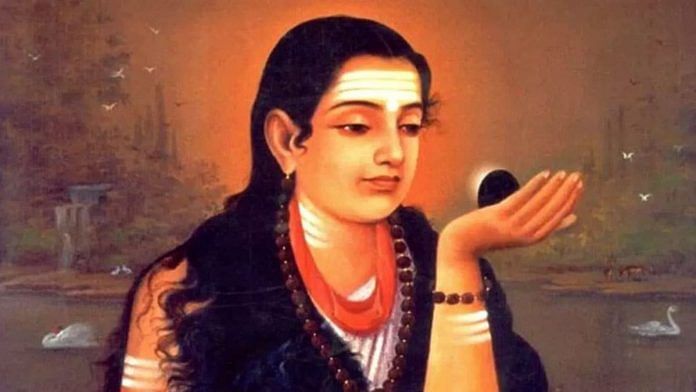Former IAS officer and poet K. Jayakumar was no expert on women mystics and saints, not until he ‘met’ them through their writings and poems. With the curiosity that fuels the muse in every poet, he delved into their works and found himself fascinated by their “reckless abandon,” “love and longing” and above all, the “spareness that comes with being single-minded.”
They displayed such audacity that devotion proved to be transgressive, said Jayakumar at a talk on Women Saints of India: The Roots of Their Spiritual Audacity at Delhi’s India International Centre Monday. They always interrogated social norms with an intensity that set them apart from male saints.
In the 500-odd verses written by Buddhist women saints in Therīgāthā, one of the earliest known collections of women’s literature—compiled over the course of 300 years with some poems dating back to the 6th century BC—there exists a constant tussle between notions of home and homelessness. For them, freedom is achieved through abandoning this metaphorical home and embracing homelessness, or the discomfort that accompanies it.
A consequence of this freedom or perhaps even its cause is the complete disregard of the physical body. Jayakumar, who is also the founding vice-chancellor of the Malayalam University in Kerala’s Tirur, inferred that their gender, their sexuality—the core of what ties them to society—is eclipsed by their spirituality.
Akka Mahadevi, the 12th-century Lingayat poet from Karnataka, “described herself as a woman only by name and lost her sexual identity to lifelong surrender,” he added.
They exemplified a way of life that was at complete odds with modern times. “Isn’t that why we’re all here? Because we can’t live like this?” he joked.
Not everyone was convinced of Jayakumar’s use of the word ‘audacity’ to describe India’s women mystics and saints. There is “nothing audacious about their modes of living if it stems from spiritual attainment,” said a woman who was attending the talk.
Also read:
Reading Lal Ded, Akka Mahadevi
As a poet, Jayakumar was drawn to their clarity of thought, directness, unmistakable confidence in their work and above all, their fearlessness.
He read a verse by 14th-century Kashmiri poet, saint and mystic, Lalleshwari or Lal Ded— “Here, in this lifetime, I’ve been unchained from the wheel of birth and death. What can the world do to me?” According to Jayakumar, her confidence had its roots in the “freedom from the insecurity and bashfulness of being a woman.”
Before anyone in the audience could question this, he urged them to view the verse not through the lens of “modern feminism” but from the provided perspective of all-encompassing devotion and spirituality.
Some in the audience were not convinced by Jayakumar’s argument, urging him to speak on the “social rebellion” of these poets instead.
However, Jayakumar dodged such questions by maintaining how “it is unfashionable to talk about spirituality these days,” and that he wasn’t “talking about religiosity.”
He chose to read a poem by Akka Mahadevi to end the session on a strong note. “Who cares…who strips a tree of leaves once the fruit is plucked..who cares..who ploughs the earth after it is abandoned,” he read. “They were not thinking about being naked.”
(Edited by Zoya Bhatti)



